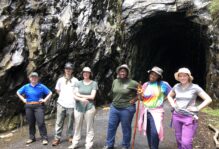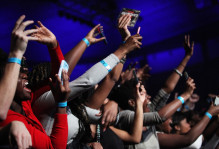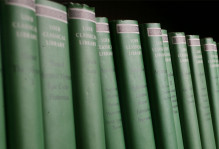Faculty Panel: Orientation for the Class of 2016
I was honored to speak today to the first year and transfer students in the William and Mary Class of 2016 about our academic expectations. You can download my talk (pdf).
Faculty Panel: Orientation for the Class of 2016
Anne H. Charity Hudley
College of William and Mary
August 25th, 2016
1. Introduction
Welcome, Class of 2016 and transfer students, to the College of William and Mary! I hope you got some rest last night and I hope that you had some fun! My name is Professor Anne Harper Charity Hudley and I am Associate Professor of English and Education. I work primarily within the Linguistics, Africana Studies, and Community Studies programs and I serve as the William and Mary Professor of Community Studies. My research and publications address the relationship between linguistic and cultural variation and pre K-16 educational practices and policies. Specifically, I study how the language students use impacts the way teachers interact with students and are able to best instruct students. I also work to help educators understand that language is culture so that we must work to teach students what they need to be successful in schools without eradicating or devaluing their home language and culture.
William and Mary is a small college and like many of you, I like to do many things at once, so I am also the Director of the William & Mary Scholars Program and the William and Mary Scholars Undergraduate Research Experience, also known as WMSURE. I am from Henrico County, Virginia and attended St. Catherine’s School in Richmond, VA. The first week of college can be amazing and it can be a little scary as well. We planned a lot for today, it’s a little scary for us as well and that’s OK!
2. What does it mean to be a Scholar?
I’ve been asked to talk to you a bit today about classroom and academic expectations. In short, we faculty at William and Mary expect you to be scholars. Thinking broadly, what does it mean to be a scholar? It means you get to ask yourselves and then more importantly answer the following questions:
How many more lives you can touch as a college educated person? Including your own? You are now living your dream- either full on or, I hope, at least a part of it. As I walked around during move-in yesterday, I spoke with students who were third generation W&M students and I spoke with students who were the first in their families to go to college. What an amazing range of legacy and new spirits you can combine into learning with in the liberal arts framework for a public good.
How much more good you can do for the world and what can you contribute both to your local community and the world at large? It is important to remember that good can be defined in a myriad of ways. Good is intellectual, financial, social, and spiritual to name just a few. We wait anxiously for the combination that you will create! I’ll ask you now and I’ll ask you over the next four years: What do you want to be when you grow up? It was an important question in kindergarten and it’s an important question now as that range of what you can possibly be expands.
What ideas can you create, models can you build, and solutions can you discover that have never been though of before? Learning the content is just the beginning; synthesizing it and building upon it is the name of the game. We are here to be masters of knowledge and also challengers of the status quo and full time thinkers and dreamers!
3. Differences Between High School & William and Mary
To make this type of scholarship possible it is important to think about some of the possible differences between your high school and other educational experiences and the experiences that you will have at William and Mary. Those of you who have taken AP, IB, have been dually enrolled, and those who have transferred will find that these distinctions will apply to you as well as to students who have not had those experiences, so everyone, listen up!
The William and Mary and greater academic culture is constantly shifting and changing and that is the nature of being at a university. In high school, school or state standards determined much of what you had to know. Here at William and Mary, in many ways, YOU ultimately decide what you need to know. Within that, individual professors within general college, and state, and accreditation guidelines determine much of what you need to know for our classes. It is important, then, to understand the expectations of individual professors and the only way to know is to ask. That means asking about things big and small and small things that may end up big. That means asking what the professor wishes to be called both in person and on email. Some prefer “Professor”, some prefer “Doctor” if they hold a doctorate (ask if they do), some prefer “Ms.” to “Mrs.” or “Miss”, others prefer to be called by their first name (again, ask!). It is important to ask each professor about their policies and philosophies on the use of laptops, cell phones, and smart phones. Professors have different rules and it’s important to understand their rationale about why you should or shouldn’t be online during lecture and/or discussion. I take notes on my iPhone but to other profs it might appear as if you are not engaged and are texting, you need to know if that is the case. If plagiarism has been explained to you but you are still unsure of all that it entails, ask! If it hasn’t been explained to you yet, ask!
In high school, you most often studied according to a pre-determined program and schedule. Here at William and Mary, you can study and research whatever you are interested in. We are here to make it happen together! For those reasons, it’s important to maximize your contact with professors both inside and outside of the classroom so that you can best understand what is expected of you. Many of us both teach classes and direct research groups or labs. Our strongest students are present in both contexts. With such opportunity also comes the responsibility for making sure your requirements are met within the class, major, and graduation guidelines but I’ll put a plug in here for self-designed majors and the Community Studies minor that really do let you combine your interests in innovative ways! It is up to you to ensure that your readings and practice problems and exercises are completed before class, you have to make sure that you understand the syllabus and the information provided, it is up to you to make sure you have all that you need for you to be successful and that we as faculty understand explicitly what your individual definition of success is and that you understand our individual definitions as well. So ask!
Another crucial aspect of being a scholar is understanding how to cope with both success and challenges. In high school, you were near the top of the class as defined by your school. That’s part of how admissions works here at William and Mary. Now that you’re here, everyone was near the top of the class; now the definitions of top will differ dynamically. There is a deep pool of diverse ability among you! People can do what you do and some can do it better. Some of you can do it better than anybody! Some of you can do stuff that we didn’t even think of yet!
For many of you, this change will mean a change in your interpretation of success. This change will also mean a difference in your interpretation of study skills: For those of you who didn’t have to take notes, create study guides, do the reading in high school, you will probably have to now to remain at the top of the class; that I can be pretty sure of. Learning how to synthesize large amounts of information and how to create unique and well-synthesized arguments are critical to the scholarly process. Professors are more than willing to talk with you about the best ways to prepare and study for their classes and to refer you to students who have taken their classes for peer advice. Xavier University in New Orleans, Louisiana has a great way of thinking about the diversity of academic experiences that you may have had prior to coming to William and Mary: “What doesn’t work is saying, ‘You need remedial work.’ What does work is saying, ‘You may be somewhat behind at this time but you’re a talented person. We’re going to help you advance at an accelerated rate.” We too know that you are talented, so if you find that you need to advance at accelerated rate, please let us know. The Dean of Students Office, the Writing Resource Center, the Tribe Tutor Zone, the counseling center, the center for student diversity, programs including PLUS and WMSURE are all here to support that transition and process. You should be using them ALL as resources regularly, not just when challenges arise! You don’t want your first visit to your professor’s office hours to be after you have had challenges with an assignment or exam. Get to know them now so that the sky remains the limit. Schedule the office hours just as you schedule the class. It’s going to be up to you to make the extra appointment, to get the extra hour of sleep so that you get to class on time and then stay awake (we notice, even in big lecture halls), and to make sure you eat properly so that your brain is operating at maximal function.
4. What Does It Mean to Be a Scholar at William and Mary?
So now we’ve worked a bit to define what it means to be a student vs. a scholar. What does it mean to be a scholar among scholars at the College of William and Mary? It truly means that you belong here and that I am honored that you are here. We as professors aim to be among your greatest inspiration, greatest challengers, and your greatest resources. During your advising appointments on Monday, that road to being a scholar starts. You will learn about your advisor’s interests and triumphs as scholars and you can also learn about their challenges. Ask your professors, what’s the lowest grade they’ve ever gotten; when where their paths were windy. What were their greatest accomplishments? What co-curricular activities did they do in college? You might be surprised. Ask your fellow students as well. Those stories of success and navigation will pave the way for the next year of scholars and those generations thereafter.
5. Segue into research and conclusion: In conclusion, what is expected in College? Responsibility and perseverance!
Among the faculty seek out those great number of us who truly believe that in order for William and Mary to be successful, we desperately need you to be successful. The best aspect of William and Mary is that you directly engage with faculty and we directly engage with you. Take advantage of it. You all are my co-researchers, co-authors, co-designers of community studies and WMSURE. WMSURE is all about making sure that students who have historically been underrepresented at William and Mary are maximally successful and take advantage of every academic resource the College has to offer.
For many of my students, the shift that was the most pronounced was that of the dynamics of intellectual authority in the classroom. In high school, students are often recipients of knowledge, whereas at William and Mary, knowledge is often a collaborative creation of both students and professors. That’s a wonderful gift in so many ways; it means that you’re invited to treat your professors more as peers than you did your teachers (and here’s where, of course, the research component comes in). But it also means that you need to step up; you’re not doing it right if you don’t do your assignments and readings and come to class fully prepared to engage.
It is a big responsibility for you when I say quite literally that your success is my success. The success of the person sitting next to you is your success. The success of your BFF/brother from another mother that you haven’t met yet is your success! And my father, whose mother dreamed of him coming to William and Mary in a time when Jim Crow laws made that impossible wants me to tell you that if I’m the one who’s giving you THIS talk at William and Mary, then you can definitely be president or anything else you might want to be! So get to it!
Anne H. Charity Hudley, Ph.D.
Associate Professor of Education, English, Linguistics, and Africana Studies
Associate Editor, Language
William and Mary Professor of Community Studies
Director, William & Mary Scholars Program
Co-Director, William & Mary Scholars Undergraduate Research Experience (WMSURE)
The College of William and Mary
Williamsburg, Virginia
acharityhudley@wm.edu
Resources:
Transition from High School to College:
SMU: How is College Different From High School
MSTC:Youth Options: High School vs. College (pdf)
Counseling Support Groups:
Counseling Center: Available Counseling Groups
Study Skills:
Dean of Students Office: Study Skills
Dartmouth Academic Skills Center: Where to Study/How to Study
- Strategies for Improving Concentration and Memory – Virginia Tech
- I Just Can’t Seem to Concentrate! – University of Pennsylvania
- Increasing Motivation – University of Victoria
- Improving Your Memory – Texas A&M University
Study Tips:
- Basic Study Techniques – Texas A&M University
- Study Hacks – Blog created by Cal Newport
- Ten Traps of Studying – University of North Carolina
- Top 11 Study Skills – Stanford University
- Study Environment Analysis – Virginia Tech
- Study Skills Checklist – Virginia Tech
- Putting Your Extracurricular Skills to Use in Your Studies – Princeton University
- How to form a successful study group – Duke University
I did not write this alone. Thanks to all of my family, teachers/mentors, friends/colleagues, classmates, current and former students for their input. I’d like to give a special thanks to my father, Dr. Renard A. Charity Sr. who helped me with every major idea. All contributors are listed below.
My family:
Dr. Renard A Charity Sr. (my father)
Dr. Cynthia M. Charity (my mother)
Mrs. Renee Charity Price, St. Catherine’s School (my sister)
Mr. J. Christopher Hudley, The College of William and Mary MBA ’14 (my husband)
My teachers/mentors:
Mr. Steve Cambisios, St. Catherine’s School
Dr. Brian Joseph, The Ohio State University
My colleagues:
Ms. Kirsten, Bradley, Booker T. Washington High School, Norfolk VA Public Schools
Dr. Christy Burns, The College of William and Mary
Ms. Angelique Clarke, Chesterfield County VA Public Schools
Ms. Nancy Everson, The College of William and Mary
Dr. John Griffin, The College of William and Mary
Dr. Jill Hallett, Illinois Institute of Technology
Dr. Lisa Landino, The College of William and Mary
Dr. Rowan Lockwood, The College of William and Mary
Dr. Christine Mallinson, UMBC
Dr. Susan Tamasi, Emory University
Dr. Carol Tieso, The College of William and Mary
Ms. Ashleigh Greene Wade, St. Catherine’s School
Dr. Brett Wilson, The College of William and Mary
My classmates and classmates of my sister:
Dr. Rachel Easterly Gagen, F.Read Hopkins Pediatrics (from St. Catherine’s School)
Mrs. Kara Bleecher, Hanover High School (from St. Catherine’s School)
Dr. Damien Hall (from the University of Pennsylvania)
Carsten Reichel (from Harvard University)
Ms. Georgina Sommerville (from Cambridge University, UK)
Ms. Terelle Wilson (classmate of my sister from Northfield Mount Hermon)
My students:
Kira Allmann, The College of William and Mary ’10, PBK, Rhodes Scholar, Oxford University, UK
Brittney Calloway, The College of William and Mary, ’10, George Mason, MEd ’13
Kate Chelak, The College of William and Mary ’11, MEd, ’13
Elizabeth Coppock, Stanford University, PhD ’09
Katherine DeFazio, The College of William and Mary ’14
Juliana Glasco, The College of William and Mary ’08
Renee Seibel King, The College of William and Mary ’05, PBK, BA Utah State University
April Lawrence, The College of William and Mary, EdD, ’14
Brittany McLaughlin, The University of Virginia ’07; University of Pennsylvania, PhD ’14
William B. Morris, The College of William and Mary ’11, University of Pennsylvania, MA. ’13
Luke Pickett, The College of William and Mary ’14
Daniel Villarreal, The College of William and Mary Class of 1940 Scholar ’10, PBK, University of California Davis ‘ 15




No comments.
Comments are currently closed. Comments are closed on all posts older than one year, and for those in our archive.